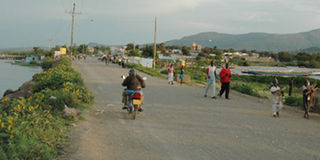Solar kits to boost war on malaria

PHOTO | JACOB OWITI | FILE Residents cross the Mbita Courseway that links Mbita mainland and Rusinga island.
What you need to know:
- The concept is to lure mosquitoes into traps using nylon strips thereby reducing dependency on insecticides
- SolarMal has so far installed the trap on about 470 homesteads since the project was rolled out on the June 3
A group of local and foreign researchers have developed a plan to eradicate malaria from a Kenyan island without using insecticides.
The solar powered mosquito trap is part of a three-in-one idea that will also provide residents of Rusinga Island with sustainable electricity.
Each house is fitted with a rooftop solar panel, two light fixtures and a charging point for mobile phones.
Dubbed SolarMal, the trial project which begun in February 2012, is led by Prof Willem Takken of Wageningen University in the Netherlands and Dr Richard Mukabana of the International Centre of Insect Physiology and Ecology.
The project targets more than 4,200 homesteads in the next four years.
REDUCE DEPENDENCY
The concept is to lure mosquitoes into traps using nylon strips thereby reducing dependency on insecticides.
Dr Mukabana says: “Malaria is a problem, especially for the 30,000 people in Rusinga Island. The daily trapping of mosquitoes leads to a gradual decline in their population, so people will receive fewer mosquito bites and leading to fewer malaria cases.”
SolarMal was started to combat malaria after the failure of another project that aimed at distributing more than 10 million mosquito nets.
Researchers say mosquitoes have developed resistance to insecticides used in nets and aerosol cans.
SolarMal attempts to address this new challenge.
World Health Organisation categorises malaria as one of the world’s deadliest diseases, annually infecting more than 200 million people and killing about 660,000, most of them African children.
Rusinga is not connected to the national grid and that is why the researchers opted for solar energy.
To lure mosquitoes, the researchers placed nylon strips containing artificial human odour into the trap. The trap is named Suna — Luo word for mosquito.
A solar-powered fan in the trap then sucks the mosquitoes in and once in the trap, the insects die.
SolarMal project manager Collins Mweresa explains: “Female mosquitoes (which carry the malaria parasite) require human blood for egg development, find people by smelling, and are drawn to their odour. This is the mechanism SolarMal uses.”
SolarMal has so far installed the trap on about 470 homesteads since the project was rolled out on the June 3.
The battery for the trap can last up to three years while the synthetic bait can be changed at least twice a year and thus requires minimal maintenance.
The mobile charger is another attraction for residents.
“People here had to travel all the way to Mbita to charge their phones, costing them over more than Sh200 in a week,” Mr Mweresa says. “With this project people have a source of income and are saving on costs too.”
Moreover, residents now also have reliable power supply.
Health Ministry’s David Soti notes that, “if it can get rid of the vectors (mosquitoes) it will be a plus in our efforts against malaria.”




